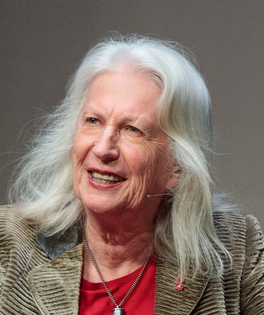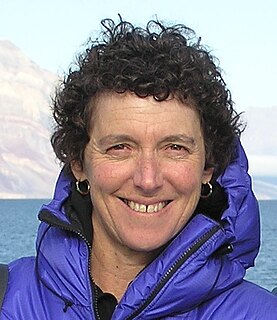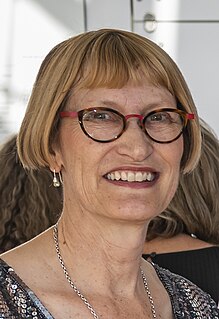
Margaret Elizabeth Austin is a former New Zealand politician. She was an MP from 1984 to 1996, representing first the Labour Party and then briefly United New Zealand.

The Rutherford Medal is the most prestigious award offered by the Royal Society of New Zealand, consisting of a medal and prize of $100,000. It is awarded at the request of the New Zealand Government to recognize exceptional contributions to the advancement and promotion of public awareness, knowledge and understanding in addition to eminent research or technological practice by a person or group in any field of science, mathematics, social science, or technology. It is funded by the New Zealand government and awarded annually.
Sir Albert William Liley was a New Zealand medical practitioner, renowned for developing techniques to improve the health of foetuses in utero.

Dame Mary Anne Salmond is a New Zealand anthropologist, environmentalist and writer. She was New Zealander of the Year in 2013. In 2020, she was appointed to the Order of New Zealand, the highest honour in New Zealand's royal honours system.
David Francis Gerrard is a sports administrator, sports medicine specialist, and former Olympic Games swimming representative from New Zealand.

Sir Peter David Gluckman is a New Zealand scientist. Originally trained as a paediatrician, he served as the inaugural Chief Science Advisor to the New Zealand Prime Minister from 2009 to 2018. He is a founding member and current Chair of the International Network for Government Science Advice, and is President-elect of the International Science Council.
Sir William Ian Axford, FRS was a New Zealand space scientist who was director of Germany's Max Planck Institute for Aeronomy from 1974 to 1990. Axford's research was focused on the interaction of the sun with the magnetic field of earth (magnetosphere) or the interstellar medium (heliosphere).
William Henry Robinson was a New Zealand scientist and seismic engineer who invented the lead rubber bearing seismic isolation device. He grew up in West Auckland, New Zealand. He earned a master's degree at the Ardmore School of Engineering, then a PhD in physical metallurgy at the University of Illinois. Robinson was director of the DSIR's Physics and Engineering Laboratory between 1985 and 1991. He continued to invent and develop seismic isolation devices, travel and lecture until his early 70s.
The Marsden Medal is a yearly award given by the New Zealand Association of Scientists. It is named after Sir Ernest Marsden and honours "a lifetime of outstanding service to the cause or profession of science, in recognition of service rendered to the cause or profession of science in the widest connotation of the phrase." It rivals the Rutherford Medal from the Royal Society of New Zealand.
Robin Wayne Carrell is a New Zealand-born haematologist.

Gillian Shirley Wratt is a New Zealand botanist and science administrator. She was the first woman director of the New Zealand Antarctic Programme (1992–1996) and made a Member of the New Zealand Order of Merit for services to Antarctica.

Sir Richard Lewis Maxwell Faull is a New Zealand neuroscientist and academic who specialises in human neurodegenerative diseases. He is a professor of anatomy and director of the Centre for Brain Research at the University of Auckland.

Anne Victoria "Vicky" Cameron (ONZM) is a New Zealand medical researcher specialising in molecular endocrinology.

Dame Jane Elizabeth Harding is a New Zealand academic new-born intensive case specialist (neonatologist). She was awarded the Rutherford Medal in 2019.
Warren Perry Tate is a New Zealand biochemist and professor of biochemistry at the University of Otago.
Carolyn Waugh Burns is a New Zealand ecologist specialising in lakes. She is an emeritus professor at the University of Otago.

Sally Anne Brooker is a New Zealand inorganic chemist. She has been a full professor at the University of Otago since 2006.
Barbara Else, also known as Barbara Neale, is a writer, editor, and playwright. She has written novels for adults and children, plays, short stories and articles and has edited anthologies of children's stories. She has received a number of awards and fellowships including the New Zealand Order of Merit for services to literature, the Storylines Margaret Mahy Medal and the Victoria University of Wellington's Writer's Fellowship.
Joel Ivor Mann, generally known as Jim Mann, is a New Zealand nutritionist and endocrinologist. He is professor in human nutrition and medicine at the University of Otago and consultant physician (endocrinology) at Dunedin Hospital. He has researched the role of lipids and carbohydrates in coronary heart disease, diabetes, and obesity, as well as the relationship between obesity and cancer.
Dame Patricia Mary Harrison is a New Zealand educationalist.









